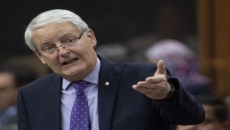OTTAWA - A group of senators is calling on the federal government to strike a grand economic plan with provinces, territories, businesses and civil society to drive growth coming out of the pandemic.
The report includes calls to rethink how to deliver skills-training programs, to streamline the regulatory system to encourage entrepreneurs and for companies to invest in themselves.
The document also says the federal government must come up with a more credible plan to manage the nation's burgeoning debt through new rules to guide budgetary decisions.
Senators say the Trudeau Liberals must consider finding more new sources of revenue and suggest the government increase the value of federal sales tax.
The report made public Tuesday is the culmination of work that started last November and included interviews with some 70 domestic and international experts about how Canada could avoid another era of low economic growth.
Sen. Peter Harder, one of the 12 senators who worked on the report, says the group believes the country shouldn't wait until after the pandemic to rethink how to improve Canada's economic performance.
"This is very much a national task," he said in an interview. "It's not going to be easy, but is absolutely essential if we want to improve our competitive performance."
Canada's economy faced headwinds prior to the COVID-19 pandemic, including productivity declines that mean Canadians work longer to match the output of counterparts in the G7 countries.
Waning business investment, which could reverse the productivity decline, is also lower in Canada than many peer nations.
The report from senators singles out the domestic tech sector for extra attention.
It recommends governments help improve access to capital and streamline regulatory regimes to help companies grow and compete globally.
Sen. Colin Deacon said regulatory changes wouldn't cost the government money, and allow new, innovative businesses to enter the market.
It would be a change in mentality for governments by moving “to catalyze, not control,” by putting in key policy frameworks for the digital economy and regulating where needed.
Deacon said the mentality shift is possible, noting how quickly federal officials crafted emergency aid programs for workers and businesses.
“What we did see in the initial response to the pandemic was government willing to put forward a plan, examine how it was working, and iterate,” he said. "And that doesn't happen. Normally, what happens in government is they put forward a plan, and then they dig in."
Any new spending will be heaped on top of the historic debt levels. The Liberals have promised to focus on having the debt decline as a proportion of the overall economy, known as the debt-to-GDP ratio.
The report recommends two alternative measures: keeping debt service costs below 10 per cent of federal revenues, an idea put forward by former Bank of Canada governor David Dodge, or cap federal program spending as a percentage of gross domestic product.
Senators say there isn't a need for austerity, but rather a need to avoid financing new programs through more debt.
The group also suggests raising the Goods and Services Tax to seven per cent from five per cent, and increase the value of the GST tax credit to offset costs for low-income households. A C.D. Howe Institute report estimated the measures could yield $15 billion annually in new tax revenues.
Harder said spending guidelines and new revenue measures would signal the government takes seriously the need to manage the debt.
"That in itself creates economic confidence going forward that governments will be responsible in their fiscal programming," he said.






